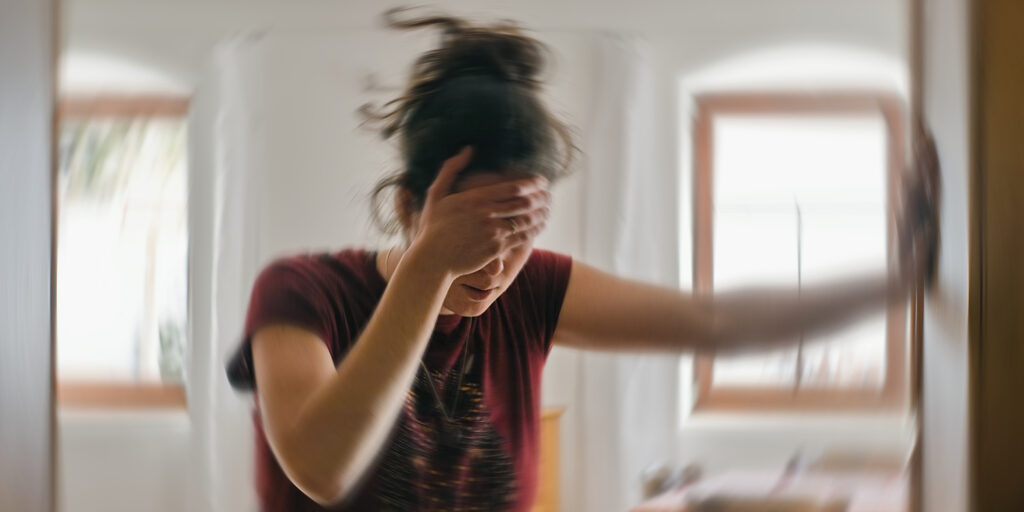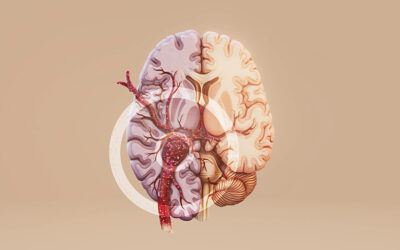From Ear Problems to Anxiety: Understanding Possible Causes of Vertigo

Vertigo is more than just a bout of dizziness; it’s an unsettling feeling that everything around is spinning, tilting, or shifting, even when the body is still, and can make it difficult for the affected individual to maintain balance, walk, or carry out everyday tasks. While it might seem like a minor issue, vertigo often points to an underlying condition affecting the inner ear, brain, or even emotional health. In this blog, we have discussed the various causes of vertigo, its symptoms, how it’s diagnosed, and the treatments available to help manage the disorder.
Table of Contents
ToggleWhat is Vertigo?
Vertigo is a symptom, not a disease. It creates a false sense of movement, most commonly described as spinning or swaying, despite being stationary. Some individuals may feel as if the room is spinning around them, while others may experience a sense of tilting, imbalance, or light-headedness. Vertigo often originates in the vestibular system, which includes parts of the inner ear and brain responsible for balance and spatial orientation. It may occur briefly or persist for longer durations depending on the underlying cause.
Vertigo is frequently confused with general dizziness, but the two are different. Dizziness is a broader term that can refer to feeling faint or unsteady, while vertigo specifically relates to a sensation of spinning or motion.
Common Symptoms of Vertigo
The symptoms of vertigo may vary depending on the cause, but most individuals describe a distinct spinning or whirling sensation. Vertigo can be episodic or continuous and may worsen with movement such as turning the head or standing up quickly. Some of the common symptoms of vertigo include:
- A sensation of the room spinning or tilting
- Loss of balance or unsteadiness
- Nausea or vomiting
- Headache or pressure in the ear
- Involuntary eye movements (nystagmus)
- Sweating or a sense of panic during episodes
In more severe cases, vertigo may also affect walking or standing, making routine tasks difficult without support.
Types of Vertigo and Their Underlying Causes
Vertigo can stem from a range of medical conditions, each affecting balance in different ways. Understanding the type of vertigo helps guide accurate diagnosis and treatment.
Positional and Inner Ear Vertigo
The inner ear plays a key role in balance. When disrupted, it can lead to intense, often sudden vertigo. Common conditions include:
- BPPV (Benign Paroxysmal Positional Vertigo): Caused by tiny crystals in the inner ear shifting out of place, triggering brief spinning sensations with head movements.
- Labyrinthitis: Inflammation of the inner ear, often following a viral infection. It can lead to vertigo, hearing loss, and balance issues.
- Vestibular Neuritis: Similar to labyrinthitis but without hearing loss, this condition involves inflammation of the vestibular nerve.
- Meniere’s Disease: A chronic disorder marked by episodes of vertigo, tinnitus (ringing in the ear), and fluctuating hearing loss.
Anxiety-Related Vertigo
Mental health conditions such as anxiety and panic disorders can either mimic vertigo or worsen existing symptoms. Hyperventilation, muscle tension, and heightened stress responses can disturb balance perception, leading to dizziness or light-headedness. Though not a direct vestibular disorder, anxiety-related vertigo requires equal attention and care.
Cervical and Neurological Vertigo
Not all vertigo originates from the ear. Other causes include:
- Cervical Vertigo: Stemming from neck injuries, poor posture, or cervical spine problems that disrupt signals to the brain.
- Migraine-Associated Vertigo: Some individuals with migraines experience vertigo before or during headaches.
- Neurological Conditions: Disorders such as multiple sclerosis or side effects from certain medications may also lead to balance disturbances.
How Is Vertigo Diagnosed?
Diagnosing vertigo begins with a detailed medical history and physical examination. Since vertigo can arise from various sources, including the ear, brain, or psychological factors, pinpointing the exact cause is essential for effective treatment.
Doctors may evaluate:
- Symptom patterns (e.g. triggers, duration, frequency)
- Eye movements (to detect nystagmus or abnormal reflexes)
- Balance and coordination (using simple standing or walking tests)
Additional diagnostic tests may include:
- Audiometry: To assess hearing loss associated with inner ear disorders.
- Videonystagmography (VNG): To track involuntary eye movements caused by vestibular dysfunction.
- MRI or CT scans: If neurological causes are suspected.
- Dix-Hallpike test: Specifically used to identify BPPV by triggering vertigo in a controlled setting.
Treatment Options for Vertigo
The treatment for vertigo depends on the underlying cause. Some conditions resolve on their own, while others may need medication, therapy, or targeted interventions.
For Inner Ear Causes (e.g. BPPV, Vestibular Neuritis, Labyrinthitis):
- Canalith Repositioning Techniques (e.g. Epley manoeuvre): Often effective for BPPV, this simple in-clinic procedure helps move displaced crystals in the inner ear.
- Vestibular rehabilitation therapy (VRT): A specialised form of physiotherapy to retrain the balance system.
- Medications: Such as antihistamines (meclizine), anticholinergics, or anti-nausea drugs to manage symptoms.
- Antibiotics or antivirals: If infection is the root cause.
For Meniere’s Disease:
- Low-sodium diet and diuretics to reduce fluid buildup
- In severe cases, steroid injections or surgery may be considered
For Anxiety-Related Vertigo:
- Cognitive behavioural therapy (CBT)
- Stress reduction techniques such as mindfulness or yoga
- Short-term use of anti-anxiety medications when necessary
For Cervical and Neurological Causes:
- Neck physiotherapy or posture correction exercises for cervical vertigo
- Migraine management through lifestyle changes and prescribed medication
- Treatment of underlying neurological conditions
Note: Vertigo treatment is often multidisciplinary, involving ENT specialists, neurologists, physiotherapists, and in some cases, psychologists.
Managing Vertigo at Home
While medical treatment addresses the underlying cause, simple home strategies can help manage day-to-day vertigo symptoms and reduce the risk of injury.
Helpful measures include:
- Move slowly: Sudden head or body movements can trigger vertigo. Sit up or change positions gradually.
- Stay hydrated: Dehydration can worsen dizziness—drink plenty of water, especially in hot or humid weather.
- Avoid known triggers: Such as bright lights, loud noises, or specific head positions if they worsen symptoms.
- Sleep with the head slightly elevated: This can help reduce morning vertigo in those with BPPV.
- Reduce screen time: Too much screen exposure can worsen disorientation in some cases.
- Limit alcohol and caffeine: These substances may affect the inner ear and worsen vertigo episodes.
When to See a Doctor for Vertigo?
Occasional dizziness can be harmless, but persistent or worsening vertigo should never be ignored, especially when it affects daily functioning or comes with other red flags. Medical attention is recommended if vertigo is accompanied by:
- Repeated or prolonged spinning sensations
- Sudden hearing loss or ringing in the ears
- Severe headaches or visual disturbances
- Difficulty walking or standing upright
- Slurred speech, numbness, or facial weakness
- Episodes triggered by specific head movement
Such symptoms may point to serious inner ear or neurological issues that require specialist evaluation. Early diagnosis helps prevent complications and ensures faster recovery through targeted treatment.
Why Choose Graphic Era Hospital for Vertigo Treatment
At Graphic Era Hospital, vertigo care goes beyond symptom relief; our specialists focus on identifying the root cause and offering personalised solutions for lasting relief.
Expert Care
Our multidisciplinary team includes ENT specialists, neurologists, and physiotherapists with experience in treating various forms of vertigo—from positional vertigo and labyrinthitis to anxiety-related dizziness and cervical vertigo.
Advanced Diagnostic Support
We use audiometric evaluations, vestibular testing, and imaging techniques to pinpoint the exact cause of vertigo. This enables accurate diagnosis and tailored treatment planning.
Comprehensive and Compassionate Care
Patients receive not only medical care but also physiotherapy guidance, counselling support, and home care instructions to help manage triggers and prevent recurrences.
To consult a vertigo specialist at Graphic Era Hospital, call 18008897351 and book your appointment today.
Frequently Asked Questions
What is vertigo and how is it different from dizziness?
Vertigo is the sensation that either the person or their surroundings are spinning or moving when there is no actual motion. Dizziness, on the other hand, is a broader term that includes light-headedness, imbalance, or a sense of fainting.
What causes vertigo to suddenly start?
Sudden vertigo can result from inner ear issues such as BPPV, infections like vestibular neuritis, or even stress and anxiety. In some cases, it may follow a head injury or arise from neck problems.
Can anxiety really cause vertigo?
Yes, anxiety and panic attacks can cause sensations similar to vertigo. Stress may also worsen existing vestibular conditions, creating a cycle of dizziness and unease.
What are the symptoms of vertigo?
Common symptoms include spinning sensation, nausea, loss of balance, unsteadiness, visual disturbances, and in some cases, ringing in the ears or hearing changes.
How is vertigo treated?
Treatment depends on the cause. Options may include balance exercises, medications, canalith repositioning for BPPV, or treating underlying issues such as infections, anxiety, or neck problems.
Is vertigo dangerous?
While not usually life-threatening, vertigo can increase the risk of falls, accidents, or may signal a more serious condition like stroke or neurological disease if accompanied by other warning signs.
Can vertigo be cured permanently?
Some types of vertigo, such as BPPV, can often be cured with physical therapy. Others, like Meniere’s disease or vestibular migraines, may require long-term management to reduce frequency and severity.
Are there home remedies for vertigo?
Yes. Staying hydrated, avoiding sudden head movements, sleeping with the head elevated, and limiting caffeine or alcohol can help. However, medical evaluation is important to rule out serious causes.
What is cervical vertigo and how is it treated?
Cervical vertigo is linked to neck problems that affect blood flow or nerve signals related to balance. Treatment includes physiotherapy, posture correction, and addressing underlying cervical spine issues.
By Specialities
- Bariatric Surgery
- Cancer Care
- Cardiology
- Dental
- Dermatology
- Diabetes & Endocrinology
- Endocrinology and Diabetes
- ENT (Ear Nose Throat)
- Eye Care
- Gastroenterology
- Haematology
- Health Awareness
- Health Care
- Health Tips
- Hematology
- Hepatology
- Internal Medicine
- Mental Health and Behavioural Sciences
- Metabolic
- Neonatology
- Nephrology
- Neurology
- Nutrition & Dietetics
- Obstetrics & Gynaecology
- Oncology
- Ophthalmology
- Orthopaedics
- Paediatric
- Physiotherapy & Rehabilitation
- Plastic and Reconstructive Surgery
- Psychology
- Pulmonology
- Rheumatology
- Spine
- Urology
Recent Posts
- A Complete Guide to Blood Clots in the Brain
- Heart Attack: Symptoms and Treatment
- World Obesity Day 2026: Understanding, Preventing, and Managing Obesity
- Bacterial and Viral Pneumonia: Causes, Symptoms, and Treatment Options
- World Hearing Day 2026: Empower Yourself to Protect and Improve Your Hearing
Need expert medical advice?
Share your details and our healthcare specialists will reach out to assist you.
By proceeding, you acknowledge and agree to our Privacy Policy, Terms of Use, and Disclaimer.




















